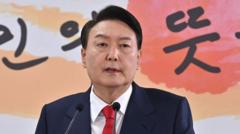South Korean President Yoon Suk Yeol has apologized following the declaration of martial law earlier this week, a controversial move aimed at addressing what he called threats from "dark forces" and North Korea. Facing mounting pressure, Yoon stated there would not be another such order and expressed regret for shocking the public during a televised address.
His declaration on Tuesday night was quickly met with backlash in the National Assembly, leading to its revocation just six hours later. Lawmakers hurriedly convened, ignoring security barriers to annul Yoon's decree. This rapid response highlighted not only the contentious nature of his governance but also the tense political atmosphere in South Korea, where public trust in the president is dwindling amid corruption allegations and a fractious opposition.
Calls for Yoon's impeachment have intensified, with the opposition planning a vote set for Saturday. To pass, the motion would require support from at least eight members of Yoon's ruling People Power Party (PPP) to achieve the two-thirds majority needed in the 300-seat parliament. Opposition leader Lee Jae-myung voiced his disappointment with Yoon's inability to resign and pledged to push for his removal from office.
Initially spurred by internal party challenges rather than external threats, Yoon's martial law order has turned into a focal point of national unrest. This crisis has transformed an already beleaguered presidency into a spectacle of political volatility, as he faces the prospect of early resignation amid calls from within his party for a change in leadership.



















